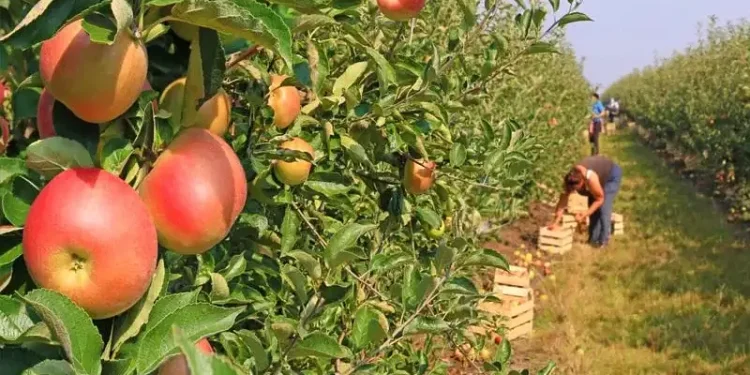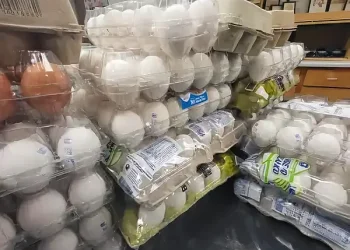The UK government has unveiled a comprehensive plan to support the horticultural and poultry industries, ensuring stability and growth for 2025.
With 43,000 Seasonal Worker visas allocated for horticulture and 2,000 for poultry, the measures aim to help farmers secure essential labour, manage disease risks, and maintain fair practices within the food supply chain.
Strengthening the Agricultural Sector
Farming plays a vital role in the UK’s economy, particularly in ensuring food security. Recognising this, the government has confirmed the Seasonal Worker visa allocation for 2025, giving farmers a clear path to plan their labour needs for the year ahead.
Daniel Zeichner, Food Security Minister, noted:
“This government recognises that food security is national security, and this can only be achieved by supporting food and farming businesses.”
With a total of 45,000 visas confirmed for the horticultural and poultry sectors, growers and producers can now plan their crops and operations, knowing that they will have access to the labour necessary to bring quality British produce to market.
The government’s approach aims to ensure that traditional/seasonal products such as strawberries, rhubarb, and daffodils can continue thriving in the UK’s fields.
Support Beyond Labour Needs
Alongside visa allocations, the government is taking further steps to reduce operational costs and secure fairness for farmers:
- Poultry Sector: The government is acting to shield poultry farmers from the impact of avian influenza outbreaks. New regulations will extend the period during which free-range eggs can be labelled as such, even when mandatory housing measures are in place to protect birds. Legislation for this change will be enacted in November 2024, taking effect from January 2025. These measures aim to level the playing field for UK farmers, aligning them with European Union regulations.
- Sheep Farming: In a move to ensure that sheep farmers receive a fair price for their livestock, the government is introducing legislation to mandate sheep carcass classification and price reporting. This initiative brings the sheep sector into alignment with the beef and pork industries, promoting transparency and fairness across the food supply chain.
Positive Experiences for Seasonal Workers
The government’s recent Seasonal Worker Survey for 2023 revealed encouraging results. Conducted in early 2024, the survey found that 91% of respondents reported a positive experience in the UK, and 95% expressed a desire to return.
These figures reflect the government’s ongoing commitment to creating a supportive environment for the migrant workers who are essential to the horticultural sector.
To build on these figures, the government is collaborating with industry partners to ensure that sponsors meet their responsibilities. This includes welfare checks for workers and providing clarity about job expectations before workers arrive in the UK. Such efforts aim to minimise unnecessary fees and costs for workers, ensuring they receive fair treatment throughout their stay.
Summary of the Government’s Support Measures
| Sector | Support Measures | Impact Timeline |
|---|---|---|
| Horticulture & Poultry | 43,000 & 2,000 visas allocated for 2025 | Immediate planning for 2025 |
| Poultry (Avian Influenza) | Extended free-range labelling during housing measures | Legislation in Jan 2025 |
| Sheep Sector | Mandatory carcass classification & price reporting | Aligned with other livestock |
The above summary highlights the diverse and targeted measures the government is implementing to ensure farmers have the tools they need for stability and growth.
Protecting UK Farmers’ Interests
Food security remains a top priority for the UK government, as Daniel Zeichner emphasised:
“Confirming the seasonal worker visa allocation for 2025 gives growers and producers certainty, allowing them to plan ahead and secure the labour they need to grow and thrive.”
To ensure this commitment is upheld, the government continues to engage with stakeholders across various agricultural sectors.
By introducing legislation and consulting on critical issues such as free-range poultry labelling, officials are working to maintain the UK’s high food production standards while adapting to challenges.
The Future for UK Agriculture
As these measures come into force, farmers and growers are better positioned to adapt to economic and environmental challenges.
Whether it’s ensuring labour availability or protecting against diseases like avian influenza, the government’s comprehensive approach aims to support British agriculture in remaining competitive and resilient.
Tips for Farmers
Farmers planning for the future should take note of the following:
- Review Labour Needs: With the 2025 Seasonal Worker visa allocation now confirmed, assess your staffing requirements and apply early to secure the needed workforce.
- Stay Informed on Legislation: Keep track of the upcoming regulations on labelling and price reporting to ensure compliance and maximise benefits.
- Engage with Government Consultations: Participate in government-led consultations to voice concerns and help shape policies that impact your sector.
By staying proactive, farmers can fully utilise the government’s support to stabilise their operations and maintain productivity.
A Brighter Future for British Farming
This series of measures signals a strong governmental commitment to UK agriculture, emphasising the importance of long-term planning and investment in the industry.
With initiatives targeting labour, disease management, and pricing, the government seeks to create a secure environment for both farmers and consumers, ensuring that high-quality British produce remains a staple in markets across the country.
Sources: THX News, Department for Environment, Food and Rural Affairs & Daniel Zeichner MP.









